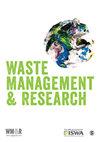Uncovering pathways towards sustainable transportation: Investigating factors influencing societal acceptance of end-of-life vehicle management in Indonesia
IF 3.7
4区 环境科学与生态学
Q3 ENGINEERING, ENVIRONMENTAL
引用次数: 0
Abstract
Addressing the critical environmental challenge of end-of-life vehicle (ELV) management in Indonesia’s transportation industry, this study investigates the complex interplay between societal factors and technical adoption. We use a comprehensive survey and path analysis to investigate the relationships between demographic characteristics (gender, age, income and education) and ELV acceptance, revealing complex preferences and concerns across several population groups. Comparative analyses with previous research reveal gender-specific inequities and age-related problems, emphasizing the importance of customized measures. Our findings indicate that environmental concerns exhibit a significant positive relationship with community acceptance (path coefficient = 0.426, p < 0.001). Moreover, technological familiarity (path coefficient = 0.352, p < 0.001) and infrastructure availability (path coefficient = 0.518, p < 0.001) demonstrate noteworthy positive associations, emphasizing the role of knowledge and accessible infrastructure in promoting acceptance. Conversely, the cost of adoption exhibits a negative relationship with societal acceptance (path coefficient = −0.269, p < 0.001), suggesting potential challenges that must be addressed. Mediation analysis uncovers the mediating roles of information exposure, perceived safety, as well as convenience and accessibility. Total effects analysis validates the collective influence of crucial factors while acknowledging the potential hindrance posed by the cost of adoption. Our findings contribute to inclusive policies and initiatives for sustainable ELV practices, offering insights to address a critical environmental issue in Indonesia. Although acknowledging limitations in scope and methodology, our research advances the discourse on sustainable transportation transitions and guides strategies to promote responsible ELV management in pursuing a greener and more socially equitable future.探索实现可持续交通的途径:调查影响印度尼西亚社会接受报废车辆管理的因素
针对印度尼西亚交通运输业在报废汽车管理方面面临的严峻环境挑战,本研究调查了社会因素与技术采用之间复杂的相互作用。我们利用综合调查和路径分析来研究人口特征(性别、年龄、收入和教育程度)与 ELV 接受度之间的关系,揭示了多个人口群体的复杂偏好和关注点。与以往研究的比较分析表明了性别不平等和与年龄相关的问题,强调了定制措施的重要性。我们的研究结果表明,环境问题与社区接受度之间存在显著的正相关关系(路径系数 = 0.426,p < 0.001)。此外,技术熟悉程度(路径系数 = 0.352,p <0.001)和基础设施可用性(路径系数 = 0.518,p <0.001)也表现出显著的正相关,强调了知识和可用基础设施在促进接受度方面的作用。相反,采用成本与社会接受度呈负相关(路径系数 = -0.269,p <0.001),表明必须应对潜在的挑战。中介分析揭示了信息接触、安全感以及便利性和可及性的中介作用。总效应分析验证了关键因素的集体影响,同时也承认了采用成本可能造成的阻碍。我们的研究结果有助于为可持续的电子学习车辆实践制定包容性政策和倡议,为解决印度尼西亚的一个关键环境问题提供见解。虽然我们承认研究范围和方法存在局限性,但我们的研究推动了有关可持续交通转型的讨论,并为促进负责任的 ELV 管理战略提供了指导,以追求更加绿色、更加社会公平的未来。
本文章由计算机程序翻译,如有差异,请以英文原文为准。
求助全文
约1分钟内获得全文
求助全文
来源期刊

Waste Management & Research
环境科学-工程:环境
CiteScore
8.50
自引率
7.70%
发文量
232
审稿时长
4.1 months
期刊介绍:
Waste Management & Research (WM&R) publishes peer-reviewed articles relating to both the theory and practice of waste management and research. Published on behalf of the International Solid Waste Association (ISWA) topics include: wastes (focus on solids), processes and technologies, management systems and tools, and policy and regulatory frameworks, sustainable waste management designs, operations, policies or practices.
 求助内容:
求助内容: 应助结果提醒方式:
应助结果提醒方式:


